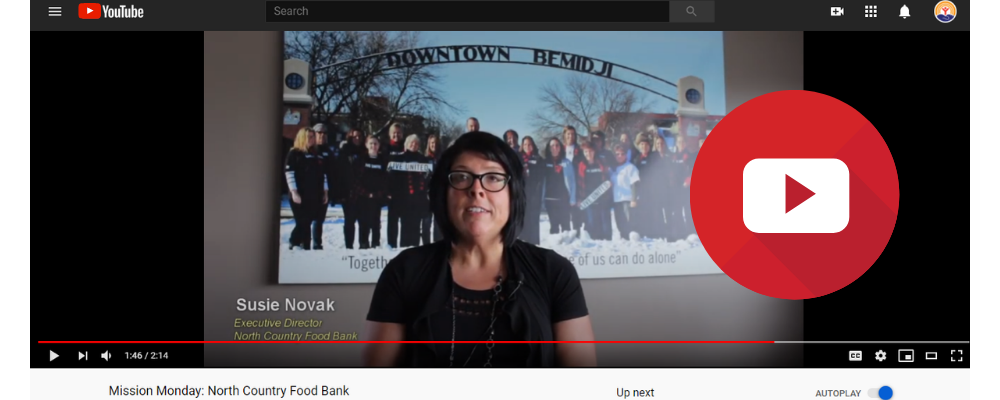

Watch the videos below to learn more about the United Way's work with food security within our community.
(CW: Mission Monday: North Country Food Bank video shares a story of child hunger)
Talk about hunger with your family, business, or other group.
Questions to start off the discussion include: What is hunger? When was the last time you “hungered” for something? How does hunger affect you—do you get “hangry”?, can you concentrate? How easy do you think it was for the little girl in the video to pay attention in class when her stomach was growling? What are other problems caused by hunger?

Activity for families: hunger goes hand-in-hand with nutrition, which means that people need not just any food, but food that gives them good health and growth. Have a coloring page that can let parents talk about a balanced, nutritious diet and is fun for the kids to color, such as this one.
There are many United Way programs and partner agencies who help provide nutritious food to community members including: North Country Food Bank, Bemidji Community Food Shelf, Churches United, Community Table, Evergreen Youth & Family Services, Adult Day Services, United Way Backpack Buddies, LSS Meals on Wheels, Village of Hope, and Bemidji Senior Center.
How can your family, business or group help solve hunger in the Bemidji Community?
One way is to donate food and/or money to the Bemidji Community Food Shelf. Take a look around your home for fresh produce, canned goods, and personal hygiene supplies and drop them off at the BCFS (1260 Exchange Ave SW, include hours).
If you’re a business, take time today to plan a food drive or personal hygiene drive at your office for the food shelf.

Share your care by using the hashtag #BemidjiUnitedInCaring on social media.

Definitions of hunger: a feeling of discomfort or weakness caused by lack of food, coupled with the desire to eat; have a strong desire or craving for; and the inability to acquire or consume an adequate quality or sufficient quantity of food in socially acceptable ways or the uncertainty of being able to do so.
Fact: Under-nutrition (not eating enough) and malnutrition (not eating enough of the nutrients recommended for proper development) lead to the deaths of approximately 40,000 children a day globally (about 15 million a year).
Fact: Children who are hungry often experience headaches, fatigue, frequent colds, and other illnesses that may causes them to be less physically active.
Fact: Undernourished pregnant women tend to have low birth weight babies. Low birth weight babies suffer from more physical illness, as well as impaired growth and development. Undernourished infants are at greater risk of dying within their first year of life.
Fact: Chronic hunger in adults weakens bones and muscles, increases the risk of illness, worsens existing health problems, and contributes to depression and lack of energy.
Fact: Iron deficiency anemia, a form of malnutrition affecting nearly 25% of poor children in the nation, is associated with impaired cognitive development. Anemia influences attention span and memory. This pervasive deficiency is now known to have a severe impact on cognitive development.
Fact: Poor maternal and infant nutrition affect an infant's birth weight, cognitive development, immune system and overall health.
Fact: Children and pregnant women have relatively high nutrient needs for growth and development. Therefore, they are often the first to show signs of nutrient deficiencies.
Fact: Children who are hungry may be less attentive, independent, and curious. Many hungry children have difficulty concentrating; therefore, their reading ability and verbal and motor skills suffer.
Fact: Short-term nutritional deficiencies affect children’s ability to concentrate and perform complex tasks. Fact: Hunger in adults produces nervousness, irritability, and difficulty in concentration.
Fact: Hunger can have a devastating emotional impact; it may diminish self-confidence and self-esteem. In a culture that encourages self-reliance, individuals who need food assistance may hesitate to seek help. They may experience feelings of shame or embarrassment due to circumstances that are out of their control.




